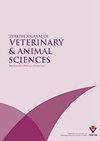Effects of selenium and zinc supplementation on cadmium toxicity in broilers
IF 0.6
4区 农林科学
Q4 VETERINARY SCIENCES
引用次数: 2
Abstract
Cadmium Cd is a toxic metal regarded as an environmental pollutant. The potential ameliorative effect of simultaneous addition of Se and Zn to broilers against Cd toxicity was examined. A total of 180 as-hatched broilers were used. There were 4 replicate pens of 3 dietary treatments: T1, T2, and T3. In T1, Se, Cd, and Zn were added to a basal diet at 0.3, 0, and 100 ppm, in T2 at 0.3, 50, and 150 ppm, and in T3 at 0.5, 50, and 150 ppm respectively. Selenium, Cd, Ca, Co, Cu, Fe, Li, Mg, Mn, Sb, As, Cr, Pb, Mo, Ni, V, and Zn were determined in breast samples using ICP-MS. Simultaneous addition of Se and Zn to broilers partly ameliorated the negative effects of Cd. The concentrations of Cd, As, and V in breast were significantly affected by the treatments while the concentration of other examined elements remained unaffected.添加硒和锌对肉仔鸡镉毒性的影响
镉镉是一种有毒金属,被认为是一种环境污染物。研究了同时添加硒和锌对肉仔鸡镉毒性的潜在改善作用。试验共选用180只刚孵出的肉鸡。试验采用T1、T2和T3 3种饲粮处理,共4个重复栏。T1、T2和T3分别在基础饲粮中添加0.3、0和100 ppm、0.3、50和150 ppm和0.5、50和150 ppm的硒、镉和锌。采用ICP-MS法测定乳腺样品中的硒、Cd、Ca、Co、Cu、Fe、Li、Mg、Mn、Sb、As、Cr、Pb、Mo、Ni、V和Zn。在肉仔鸡中同时添加硒和锌可以部分地改善镉的负面影响。这些处理显著影响了乳腺中镉、砷和钒的浓度,而其他检测元素的浓度未受影响。
本文章由计算机程序翻译,如有差异,请以英文原文为准。
求助全文
约1分钟内获得全文
求助全文
来源期刊
CiteScore
1.30
自引率
0.00%
发文量
57
审稿时长
24 months
期刊介绍:
The Turkish Journal of Veterinary and Animal Sciences is published electronically 6 times a year by the Scientific and Technological Research Council of Turkey (TÜBİTAK).
Accepts English-language manuscripts on all aspects of veterinary medicine and animal sciences.
Contribution is open to researchers of all nationalities.
Original research articles, review articles, short communications, case reports, and letters to the editor are welcome.
Manuscripts related to economically important large and small farm animals, poultry, equine species, aquatic species, and bees, as well as companion animals such as dogs, cats, and cage birds, are particularly welcome.
Contributions related to laboratory animals are only accepted for publication with the understanding that the subject is crucial for veterinary medicine and animal science.
Manuscripts written on the subjects of basic sciences and clinical sciences related to veterinary medicine, nutrition, and nutritional diseases, as well as the breeding and husbandry of the above-mentioned animals and the hygiene and technology of food of animal origin, have priority for publication in the journal.
A manuscript suggesting that animals have been subjected to adverse, stressful, or harsh conditions or treatment will not be processed for publication unless it has been approved by an institutional animal care committee or the equivalent thereof.
The editor and the peer reviewers reserve the right to reject papers on ethical grounds when, in their opinion, the severity of experimental procedures to which animals are subjected is not justified by the scientific value or originality of the information being sought by the author(s).

 求助内容:
求助内容: 应助结果提醒方式:
应助结果提醒方式:


